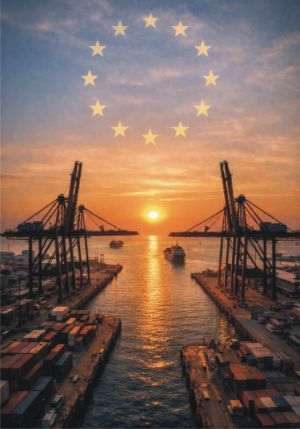From the presidency of Traian Băsescu we got a bad lesson:
"Never impose unpopular measures!"
Băsescu will go down in history anyway - a hero for some, few in number, or as a caricature, like most people claim, but regardless of that, he will provide a lesson for whoever will replace him as president, and for any government which will come from now on, for decades on end.
The row of events which culminated with the day of the referendum can also be boiled down to one phrase:
1. The populist political forces have exploited the opportunity of the dissatisfaction of the public against the state of the economy, through a series of political and legislative operations, altering the rules of democracy and intimidating the constitutional institutions.
Of course, since it's the victors that write history, in the schoolbooks, that phrase may be replaced by another, now, or later:
2. Leading the people unhappy with the dictatorship, the progressive political forces started the banishment of the tyrant and of his odious clique, using democratic means and following the constitutional means.
The two alternative phrases describe the split of the population, into one third who favors the first interpretation and a majority of two thirds which supports the second.
I confess that I for one who believe that the first is fair (like Boris Vian said, "It has been proven that the masses are wrong and individuals are always right"), because the second one is incoherent: the elimination of a dictatorship and the banishment of a tyrant can not be planned to use democratic means, through constitutional means - either it wasn't a dictatorship, or the ways weren't democratic, or the initiators of the liberation movement are dreamers.
NOTE
Those of you thinking of the historical example of Salvador Allende - the Communist who won the presidency of the state of Chile "through democratic means and by following constitutional means", in 1970, I want to warn them that on one hand, he didn't come into a power as a replacement of a dictatorship, and on the other hand, that his success was eventually determined by a crude mistake attributed to the CIA, which was only "corrected" when he committed suicide three years later.
THE SEVEN SINS OF BĂSESCU (TO SAY NOTHING ABOUT THE SMALL ONES)
The dwindling of the popularity of the candidates, over their term is not the result of some mystical socio-political law, nor is it the result of the superficiality of the electorate, which got bored of the parties which hold the power and/or of the faces of the politicians, but instead, it is generated by the discrepancy between the needs of the people and the agenda of those wielding the political power.
But the erosion of the authorities among the preferences of the public, during their government, became so widespread, that the politologists are beginning to mistake the phenomenon, considering it as common and turning it into a rule, even though any head of a human community, has the chance of even being praised, if he makes his nation happy (during periods of economic growth and stability, parties such as the Christian-Democrats in Germany, the socialists in France, or the social-democrats in Sweden endured for a long time).
Traian Băsescu is a rare case, who, even after getting a second chance, had to face the unfortunate problem of an economic and financial crisis, (which can appear once every two generations, but this one is unprecedented), for which he is not qualified enough, and in spite of his cleverness, was unable to find his way in the jungle of the experts' contradictory web of theories, hesitating, staggering in his decisions (had he not forgotten his own statements - "Focused on the people" - he would have known how to make the right choice).
The equation became too complicated: as the crisis - for which he was unprepared - began, Băsescu no longer knew how to deal with his own declared political agenda, that of modernizing the state, which he thought he was pursuing (it is debatable whether he prioritized his objectives in a realistic manner).
He showed inconsistency and he made mistakes which eroded his popularity, beyond the unavoidable alteration, coming from the austerity of the crisis regime, overlapping with the reforms, which could be construed as autocratic, when his overturned plans became incomprehensible to the population.
We have identified seven such sins.
1. The machine-man as prime minister
Băsescu wanted to control all the prime ministers he appointed, whether it was "dear Stolo", (Theodor Stolojan) who bailed as soon as he realized what he had gotten himself into, the "tough nut to crack" Tăriceanu, or the "kitchen roBoc"; he wanted to have them perform automatically, on vocal commands.
The latter - "Emil Boc the machine man" - he appreciated so much for his obedience, that he defied decency and kept him as a prime minister, by abusing the rules of democracy, even though the PM in question had been brought down by the only successful motion of no-confidence in recent history.
This stubbornness laid the foundation for the accusation that Băsescu overstepped his constitutional boundaries, that he had always intended to substitute himself to the government, and that he did.
The initially invoked method - that he had no one better than the mediocre Emil Boc - later became diabolical, through the unending state of provisionality it created and through his persistence in keeping the latter as prime-minister.
The governing through a mediocre proxy became awkward, caused Emil Boc to lose the few endearing qualities he had, taking away his ability to show initiative and to react (if he had any) and created room for corruption.
2. Governing during the crisis by pushing buttons remotely
The fact that the prime minister was made into a puppet under his command, forced Băsescu to publicly get behind the austerity measures enacted in 2010, even though they were the prerogative of the government; thus, it wasn't the prime-minister (like it should have been), but the president himself who announced the wage and pension cuts and the tax hikes; he informed us about the negotiations with the IMF, the World Bank and the European Commission.
On one hand, taking this responsibility is brave and honest, but in the aforementioned context, it is the result of the "original sin" (which has discussed earlier) and it consolidated his public perception concerning the autocratic nature of the regime, together with focusing the frustration of the population on president Băsescu - a fatal combination. All the more so, when the solution used for dealing with the crisis is extremely debatable.
3. Pimping for the PDL
Băsescu was the pimp for the government of the PDL in getting it to govern together with the PNL, for about two years (tolerating the adultery with the Conservative Party- "the immoral solution"), then helped it get a "divorce" from Tăriceanu, leaving it all by itself in the Victoria Palace (later finding solace in the Parliament, together with the PSD and the Conservative Party); later, it pushed the PDL into the arms of the PSD (for one year), only to eventually get it into a ménage-a-trois with the UDMR and the close to inexistent party of Gabriel Oprea.
Băsescu did not distance himself from the political parties, like a president should have done; instead he behaved as the president of the PDL.
4. The weakness for Elena Udrea
In the context of non-discrimination principles, promoting women in leadership positions, is a quality of president Băsescu, and promoting the sexy ones is a virtue (when they are competent and when they preserve their good moral standing), but the image of Elena Udrea was torn to shreds.
Regardless of what the truth may be, in order to further the very goal of female emancipation, she could have been pulled away from the spotlights when the voices began saying that she was the president's favorite, making her become the focus of popular hate; she could have been eventually replaced with another "amazon".
Just like it was with his insistence in supporting the mediocre Boc and the "corrupt" Videanu, keeping the "overnight rich diva" Elena Udrea as minister suggested that Băsescu has his own favorites, in other words that he is a weak man, who is dependent on his entourage (in spite of his habit of suddenly shedding people he no longer liked, which could be construed as whimsicality and lack of character - a leader who burns everything around him).
5. Fighting the corrupt, but not corruption
Were we the ones to bribe Dan Voiculescu?
No.
Did we bribe Adrian Năstase?
Did we bribe Sorin Ovidiu Vîntu?
No and no.
We only pay bribes to the policemen, to the customs agents, to the doctors, to the judges, to the bureaucrats in the public administration and to the people checking our tickets on the train.
Băsescu singled out a few "public enemies", had a spectacular showdown with them, shook down the customs agents a bit, (without any results in either case) and that was about it when it comes to fighting corruption.
The anticorruption fight was made just for show, suggesting that it was used for other political or personal objectives (just like the harassment of Sorin Ovidiu Vîntu began after they initially were bosom buddies, even though "the FNI scandal" was already four years old when Băsescu arrived in the Cotroceni palace).
6. The claim that the press is a danger to the country
Băsescu did not find a solution to the propaganda begun by the "public enemies" - the filthiest media manipulation since the censorship of Ceauşescu - and confined himself to name-calling ("moguls" and "jukeboxes"), only to then jump the shark and ask for the entire media to be included among the potential vulnerabilities to the security of the nation.
Thinking that he can get in touch with the people without any proxy, he made a mistake in minimizing the role of the press, so he did not pay the necessary attention to ensuring the balance of the media industry, which was hijacked, raped and forced to prostitute itself in exchange for the money paid by various politicians and businesspeople.
In the end, he supported the creation of other media groups which mimicked the former, except they supported him - nothing more than just a different set of prostitutes.
7. Only a moron is persistent
Băsescu didn't come every month to meet with the people in the University square, like he promised when he was first suspended (he should have been brave enough to at least come and meet with them this winter) and he changed his mind about resigning just five minutes after winning the previous Referendum, like he had imprudently said he would, meaning that his rhetorical flip-flops strained the confidence the citizens had repeatedly given him, in 2007 and in 2009.
Consistent only in his inconsistency, Băsescu changed his mind about calling his people to attend yesterday's referendum, a cowardly act which was the price paid in exchange for his ambition to return to the Cotroceni palace at any cost.
The captain did not go down with his ship, saluting. Instead he kept yelling "Electoral fraud!".
Obviously, this is not the image that Băsescu wants to be stuck with - being a coward and clinging to his presidential seat, but that was the risk.
The excuses and the reasons for doing so are less relevant.
Băsescu disappointed his supporters.
That cost him dearly.
A BAD LESSON - THE CIRCUMSTANTIAL GOVERNMENT
The failure of Traian Băsescu will deter anyone from taking any unpopular measures and the appetite for programmatic initiatives, for many years from now.
The governments will follow the polls, which wouldn't be a bad thing if they actually took them into consideration, and struck a balance between them and the domestic and international reality.
But after Băsescu being compromised, our governments will follow three criteria: 1) the customary personal interest of politicians, of the parties and of the business partnerships between them; 2) the orders of our international lenders; 3) the popularity of the planned measures.
Even if it wanted to, no future government will dare follow a multi-annual government program, or take into consideration a plan to modernize the country, but will instead sneak these criteria in-between Scylla and Charybdis.
Just like Corneliu Vadim Tudor has compromised nationalism, by pushing it into extremism and vulgarity, so did Traian Băsescu compromise the notion of driving towards a guiding light.
WHY WE DON'T GET ALONG - A GOOD EXPLANATION
The sins of Traian Băsescu (which are real) were exploited by the propaganda of his political opponents, as well as by those following their own interests - either business interests, either those who were at risk of being prosecuted, through an indecent media manipulation.
This resulted in a hideous portrayal of the president and a polarization of the public in two opposing factions (a polarization which was once again exacerbated by the mass-media of the "moguls"), which left no-room for the in-betweeners - you were either with Băsescu, or against him, "tertium non datur" - a tension which was maintained and fueled by the austerity regime.
Even if he had the talent to be an appeaser (and apparently he is exactly the opposite - a constant conflict starter), president Traian Băsescu was unable to play this part of ensuring social peace, because he became himself the apple of the national discord.
The disagreements between the opinion leaders (who were compromised anyway in numerous other political battles) collapsed into unending vicious argumentations (that is, when arguments were used instead of interjections).
The procedure resembles what the ancient sophists called "dragging a discussion on and on like old people do" (see Plato, "Euthydemos") - changing the reference system for the subject, to include a new element, which had nothing to do with the initial topic (either enlarging the field of the dicusssion, ore breaking it into pieces, for an identical result), to lead to a convenient interpretation of the new whole thus obtained.
Because the battle was one of interpretations (is Băsescu a dictator, or is it the USL that hates democracy?; is Băsescu lying, or are Ponta and Antonescu?; who is ruining the way we are perceived abroad, Băsescu or the leaders of the USL?).
-----------------------------
• Dual discourse
The notion of "dual discourse" was thrown around in all the recent comments on this period of the "insurgence" of the USL, with both factions accusing each other of hypocrisy.
In reality, journalism classes artificially introduce the notion of "dual language", because they define it as merely changing one's statements, depending on the interlocutor, for which we usually have a simpler, more common definition: lying.
Journalism teachers prefer to call lying "dual language".
And because the leaders of the USL poured the lies by the ton, it sounded more high-brow than saying that "they practice dual language", as if lying in rudimentary manner, like Ponta and Antonescu both did often, takes any special skills.
It doesn't.
Those who aren't involved notice right away that you are lying when you say that you want to drive Băsescu away, in the name of democracy, since you don't abide by the Constitution yourself.
On the other hand, those who want for Băsescu to be replaced will justify their lies, claiming it is not important, in relation to the goal.
From this point of view, Băsescu truly is more evolved.
He doesn't practice "dual language", but rather "dual speech", which does not consist of two speeches, but in having one and the same, but which gets different meanings, depending on who is listening to it.
The most obvious such type of double speech was the initial call to attend the referendum, which his supporters construed as a suggestion not to come and vote, regardless of what he might say, because it did not benefit him, whereas the European leaders admired his courage and pro-democratic orientation: "Thank you for giving me the opportunity to meet with the people".
Apparently the subsequent about-face ("Don't come and vote") thus became excusable: "The man wanted a referendum, but his opponents want to commit electoral fraud".
The latter part is probably true, but it is just as true that the electoral theft is generalized.
-------------------------
Because the contradictory reality of the Băsescu regime provides valid arguments against him, his sins seem to justify those of the "insurgents" of the USL.
But the reverse is also true, the people who support him overlook his sins, showing anger at what could be called devil-may-care attitude, imposture and contempt for the rule of the law and for democracy, expressed during the 'insurgency' of the USL.
The controversy will not end through the arbitrage provided by yesterday's Referendum, because it has the potential to go on and one.
Most likely we won't wake up until the knife of the economic crisis starts scratching the bone.
And then, just like Robinson Crusoe, we will need to draft a chart with the benefits and the advantages of the situation:
- what political regime do we have?
- what's left of what little wealth we have accumulated?
- what chances of rescue do we have?
- how are we going to live?
I hope, just like him, we will be able to put in the benefits side of the party the fact that we are survivors.
As a nation.
Otherwise, there would be no one left to make that list.
The schedule goes through the results of the polls made, over the years the results of the polls taken, over the years, by different institutes: the Political Rating Agency, BCS, CCSB, CIVIS, CSOP, CURS, Data Media, Gallup, GSS 2000, GSSC Avangarde, IMAS, INSOMAR.
Each of the aforementioned institutions was accused of being biased, due to alleged ties to various political parties or business groups with political ties.
We tried to be exhaustive when selecting the data which was used when making the chart, but we have been unable to guarantee that we have achieved this target (there is the possibility of some polls being disregarded).
The series of calculations includes, aside from the answers to the question "How much faith do you have in the following politicians?", the answers to the question "If next Sunday presidential elections took place, who would you vote for?", as well as the percentages won in the presidential elections of 2004 (the first and second round), in the referendum of 2007 and in the presidential elections of 2009 (the first and second round).
It bears mentioning that in the case of recent polls, which included both the question "Who will you vote for on July 29th, 2012, in the referendum?", as well as the question "How much faith do you have in the following politicians?", We have chosen the answer for the second question, which is more adequate to the topic illustrated by the chart.
In the case of the polls which only included the question "Who you will vote for on July 29th, 2012, in the referendum?", we have resigned ourselves to taking under consideration the answers to this sole question.
• • •
- The Political Rating Agency (Agenţia de Rating Politic): a company whose sole shareholder is Cristian Andrei;
- GSSC Avangarde (The Avantgarde Social-Behavioral Studies Group-Grupul Avantgarde de Studii Socio-Comportamentale): the head of the institute is sociologist Marius Pieleanu;
- BCS (The Social Research Bureau - Biroul de Cercetări Sociale): the company is viewed as leaning towards the NationaL Liberal Party; it has made a series of polls paid for by foundations owned by members of the PNL;
- CCSB (The Sociological Research and Branding Company): its majority shareholder is Camelia Voiculescu;
- CIVIS (The Center for Sociological Analyses and Investigations): the media associates the institute with the PNL;
- CSOP (The Center for the Study of Opinions and the Market - Centrul pentru Studierea Opiniei şi Pieţei): over the course of the recent electoral campaigns, it has cooperated with the PDL;
- CURS (The Urban and Regional Sociology Center - Centrul de Sociologie Urbană şi regională):Sebastian Lăzăroiu, former presidential advisor to Traian Băsescu was its former general manager;
- Data Media: it is said to be owned by the MediaPro trust (owned by Adrian Sârbu). The company is owned by Melania Borţun (95%) and Ileana Borţun (5%);
- The Gallup Romania organization: a subsidiary of Gallup Inc. with operational headquarters in Omaha, Nebraska, whose CEO is Jim Clifton.
- GSS 2000 (The Social Studies Group 2000): considered one of the institutes affiliated to former prime-minister Năstase. It is said that the Social Studies Group was controlled by S.O. Vîntu through Bogdan Teodorescu (who owned 50% of the GSS between November 2003 and October 2005).
Since 2005 it is owned 100% by Cătălin Lixandru, who worked predominantly with PNL.
Dan Andronic is the head of the institute.
- IMAS (Marketing şi Sondaje SA): its main shareholder is Alin Teodorescu, the former head of the Cabinet of Prime Minister Adrian Năstase and former PSD deputy;
- INSOMAR: the institute is owned by Sorin Ovidiu Vântu.
(R.M.)
























































